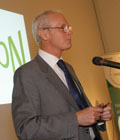SPARCLE
Overview
SPARCLE visited children with cerebral palsy in Europe, first at 8-12 and then at 13-17 years of age. 818 children of all abilities and their families from nine European regions joined the first visits and 667 the second visits.
Individuals with cerebral palsy have difficulty with movement due to injury to their brain. They were chosen for this study as they are representative of a wide range of disabled children because, as well as their movement difficulty, children with cerebral palsy may have associated learning difficulty, communication difficulty, epilepsy and hearing or visual impairments.
The main hypothesis of the study was that:
Children with similar severity of cerebral palsy will experience variable outcomes (in Participation and Quality of Life) in different countries due to variation in environmental factors.
The first phase of the study was funded by European Framework 5. The study was led from Newcastle University. The second phase was funded mainly by the Wellcome Trust and again led from Newcastle University.
The research has published over twenty peer reviewed publications, details of which are available on the website. A summary of the the main findings of the study can be found below, or on the SPARCLE website
Summary of results
SPARCLE Short summary PDF 154Kb
(2 page summary of SPARCLE 1 and 2 results)
SPARCLE Summary Brochure PDF 2,674Kb
(4 page summary of SPARCLE 1 and 2 results)
Who was involved in this study?
The Principal Investigator for this study was Prof Allan Colver
Allan Colver
- Professor of Community Child Health and Strategic Research Advisor
- Honorary Consultant Paediatrician, Northumbria Healthcare NHS Foundation Trust
- Email: allan.colver@ncl.ac.uk
- Tel: 0191 282 5966
- Studies: FEEDS study; Transition
- Recently Completed Studies: SPARCLE 1, 2
Also involved in the project from the Neurodevelopment and Disability team was:
Lindsay Pennington
- Senior Lecturer
- Speech and Language Therapist
Janice McLaughlin
- Professor of Sociology
There are also eight other Principal Investigators from other European regions involved in the study, and twenty two research staff, over the two phases of the study.
More information
Website: research.ncl.ac.uk/sparcle
Email: allan.colver@ncl.ac.uk
Call: 0191 282 5966
Other research
SPARCLE 1 and 2 sit within the 'Understanding the complexities of childhood neuro-disbaility research theme, as well as the 'Engaging Young People and Families' and the 'Lifecourse studies of neurodevelopmental disorders' themes'.
If you are looking for research linked to Cerebral Palsy incl. Hemiplegia, Quality of Life and Participation or Outcome Measurement, please view the relevant conditions and topics page.
